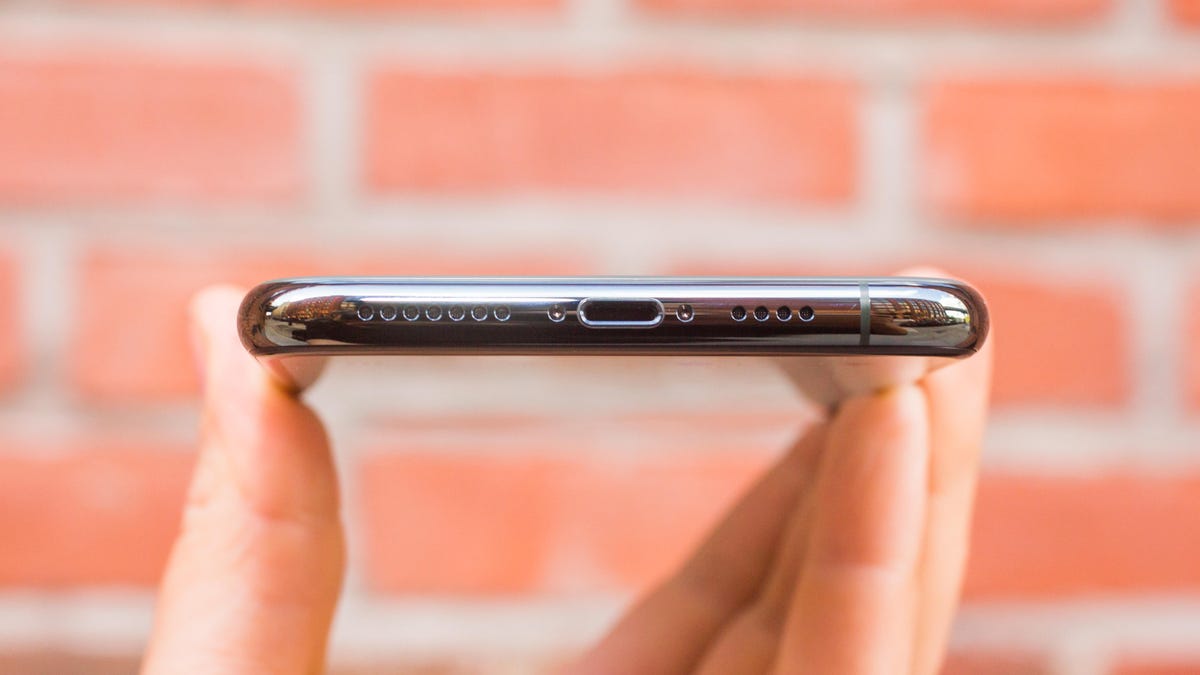A port-free iPhone is my dream and nightmare
Totally wireless gadgets are our destiny. But I have concerns.

Will this be the end, little port?
A new report on the next iPhones coming from Apple in 2020 and 2021, by reliable analyst Ming-Chi Kuo, predicts something beyond just 5G, or an iPhone SE successor, or more advanced 3D depth-tracking cameras. In 2021, iPhones may not have any ports at all.
And I'm... full of apprehension already.
Instead of moving from Lightning to USB-C, Apple may go straight into being a seamless screen-slab that charges and syncs and does everything without any physical cables.
When I read this report, I tensed up immediately. But I also knew it was coming.
We've talked about it on CNET before. And I've been interested in where wireless tech is heading for years. WiGig, or really high throughput local wireless, has promised low-latency video and graphics for things like TV and VR. Contactless charging is already here. Peripherals like the Apple Watch and AirPods are wireless already. The future of other emerging tech like VR headsets and smartglasses is also wireless. Where we're going, we don't need wires.
Except, we do. On a daily basis, I have problems with wireless connectivity of all sorts. Crackles and skips and outages. Sometimes AirPods don't connect. Sometimes AirDrop doesn't find my MacBook. Meanwhile, contactless Qi-based charging is slow, slower than wired fast-charging solutions. Having a simple cable is comforting. It's a lifeline.
Also, there's a feeling of Apple robbing us of already fine input options. First Apple came for the headphone jack. Now it's gunning for everything.
Moving from that old 30-pin port to Lightning was stressful. MacBooks losing SD card slots, USB-A ports and HDMI was stressful. Getting rid of the headphone jack was, and is, a hassle -- even if I do use wireless buds most of the time now.
I've started stocking my bags and drawers with dongles. Lightning to USB-C. USB-C to Lightning. Three pairs of headphones for plane flights. Did I bring the brick that works with the charge cable I need?
But I also got used to the changes. I'm here. I'm fine.
Wireless charging: it's been a thing since iPhone 8.
Maybe a wireless future means a dongle-free future -- if all the tech companies can agree on standards. Maybe Apple adds a smart connector on future iPhones like the one on iPads, but a more advanced version that also allows dongles to snap on (hey, remember Moto Mods?).
Maybe the cable's a placebo. It's like the modern equivalent of having a physical copy of something purely because it's comforting. I used to say I'd never give up the book or the disc, and now so much of my life is digital, virtual, cloud, streamed.
Getting rid of ports would seal up iPhones even more and perhaps make them more durable. It would also definitely make them more reliant on Apple accessories or services to connect. Then again, iOS devices are already walled off. They're harder for the layman to repair, let alone fiddle around with, and doing things with USB-C on an iPad Pro is up to the discretion of what Apple deems it wants USB-C to do in iPadOS. I can't just sideload files onto an iPhone from a computer. So, then, what am I losing if I never really had much flexibility in the first place?
I see my future as being covered in exchangeable wireless things that I sometimes use, while a simple hub is somewhere on me, powering them. That future's here now. Phones are hubs. But closing off the last hole on the iPhone will also feel like the final step of an evolution that has already been in place for a long time. We just didn't want to admit it would happen.

